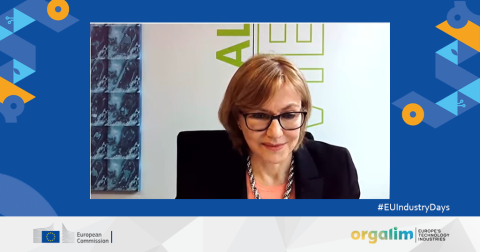EU Industry Days – Europe's technology industries at the heart of the twin transition
14 February 2022

"The manufacturing companies in Europe are really at the heart of the green and digital transition", said Orgalim President Rada Rodriguez in one of the plenary sessions at EU Industry Days, the EU's flagship annual event for industry last week. And that was evident as Orgalim and representatives from Europe's technology industries took part in session after session at the event. The take-outs were many – here is our selection of highlights:
Making the business case
To drive the twin transition, the additional investments needed – both public and private – are huge. So "Europe needs a policy framework that better rewards investments in the types of products and solutions that we all want to see", stressed Ms Rodriguez in the plenary on the business case for the EU industry investing in the green, digital and resilient economy.
That means, firstly, a Sustainable Finance framework that fully reflects the critical role of technology in reaching Europe's climate and environmental goals, she argued. Second, we need to make far better use of Europe's Internal Market, by fixing the current deficiencies in our standardisation system, strengthening market surveillance to safeguard a level playing field, and making new rules such as those for Machinery, AI, Data and Cybersecurity future-proof. Third, we need the EU to stand up for industries as global trade champions, and that includes recognising the value of our global supply chains and strengthening our access to export markets.
Europe needs a policy framework that better rewards investments in the types of products and solutions that we all want to see
Accelerating advanced manufacturing
Tuesday sessions were mainly dedicated to the different Task Forces of the Industrial Forum. Orgalim co-hosted with CECIMO the one focused on how to accelerate the uptake of advanced manufacturing. "Across different industrial ecosystems, the uptake of advanced manufacturing will be core to their ability to cut emissions, to digitalise and to become more resilient in the face of a much more unpredictable competitive environment", said Orgalim's Director General Malte Lohan in his opening remarks. And the panellists, moderated by our Policy Director Christoph Luykx, contributed numerous practical recommendations to this end.
Other Task Force sessions
Besides the Task Force session on advanced manufacturing, representatives from Orgalim’s member network also participated in two other panels around the Industrial Forum Task Forces. Joel Jonsson, Director EU Single Market and Trade Policy at Teknikföretagen, the Association of Swedish Engineering Industries, and nominated by Orgalim to Task Force 3 on strategic dependencies joined the session on addressing strategic dependencies in a co-creative way.
Mervi Karikorpi, Director Innovation, Environment and Renewal at the Technology Industries of Finland, who represents Orgalim in Task Force 4, spoke on how industrial ecosystems can contribute to the strategic autonomy of the EU, unlocking cross-border and cross-ecosystem investments.
All sessions are available for replay to registered participants here.

LATEST NEWS
How can we create a dynamic, competitive European high-tech manufacturing base?
Orgalim's key recommendations offer policymake...
